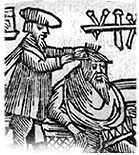

| Alexander
the Great (356-323 BCE), king of Macedonia, overthrew the
Persian Empire, conquered most of the Near East and Asia,
and laid the foundations for the Hellenistic world of territorial
kingdoms. Many legends about Alexander are preserved in the
Talmud and in medieval Hebrew literature. |
On the top
of his head Alexander had two horns that he hid under his hair. Each week
he hired a barber to cut his hair, but he was so ashamed to reveal his secret
to the barber that he had the man killed as soon as he had finished cutting
his hair. Soon only one barber, an old Jew, remained in the city.
"I cannot
kill him, for then who will cut my hair?" said Alexander.
 So
Alexander the king made the barber swear an oath not to reveal his secret
to anyone. If word of the secret reached the king's ears, Alexander warned
him, the barber would lose his head.
So
Alexander the king made the barber swear an oath not to reveal his secret
to anyone. If word of the secret reached the king's ears, Alexander warned
him, the barber would lose his head.
For weeks
the barber kept the secret to himself. Finally he could keep it no longer,
so he went to a cave and shouted at the top of his lungs, "Alexander
has horns! Alexander has horns!" Relieved at last of his terrible burden,
he returned home to his family, certain that the secret was still safe.
Through
this cave ran a stream, beside which reeds grew. One day a shepherd entered
the cave and cut a reed to make himself a flute. When he began to play the
flute it sang out, "Alexander has horns! Alexander has horns!"
Others overhead
the flute's song, and word of it soon reached the king's ears. Enraged, Alexander
sent for the barber to order his execution. But when the barber told the king
the truth, the king forgave him and let him go.
For just
as kings may have horns, caves may have ears.
|
Iraqi
Jewish legend; Edoth I: 184-185 (A. Ben Yaakov). English
language source: Patai. In : The Classic Tales: 4,000 Years
of Jewish Lore. Ed. Ellen Frankel (NJ: Jason Aronson Inc.,
1989) |